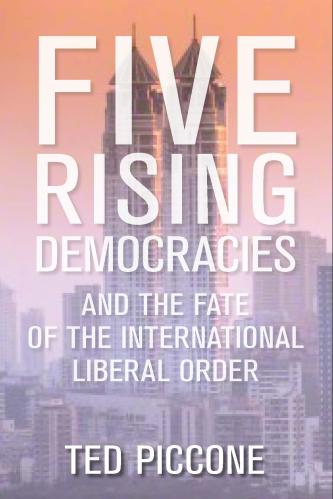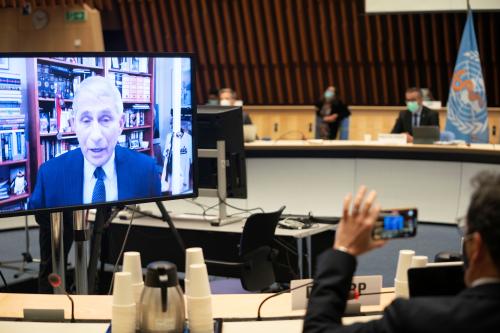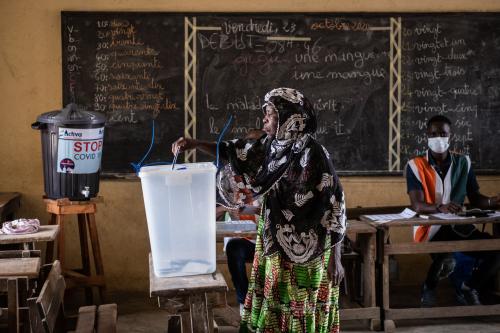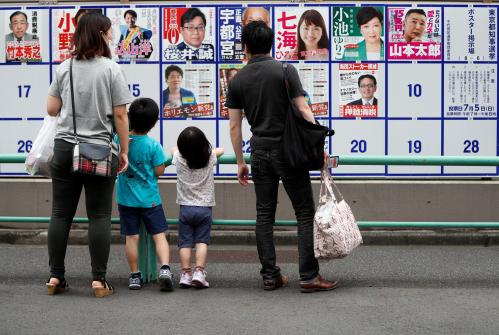As a candidate, President Joe Biden promised to convene a Summit for Democracy “to renew the spirit and shared purpose of the nations of the Free World.” Now, after a failed coup attempt aimed at overthrowing the results of free and fair elections certified by all 50 states, his administration must come to grips with the stark reality that democracy in America is in its worst crisis since the Civil War. Meanwhile, China and its allies are systematically exploiting the weaknesses of democracies around the globe.
Rather than a big summit gathering this year, this administration should do two things first: demonstrate our capacity for self-correction through a series of domestic reforms, and begin a process of consultation with its closest democratic friends on the goals and modalities of a global democratic renewal agenda. These two steps would help shore up our own fractured and increasingly dangerous politics and inspire greater confidence and cooperation among other democracies around the world.
The power of example
For starters, the Biden administration should concentrate its energies on a political reform agenda at home. Getting our own house in order and leading through the power of our example, as President Biden said in his inaugural address, must be the first order of business. The violent January 6 insurrection incited by then-President Donald Trump and his allies demands an urgent, lawful, and consequential response. Accountability for such cardinal sins against the constitutional process for peaceful transfer of power should encompass moral, political, and criminal justice.
Some of this essential work of accountability is already underway. But it must be seen through to completion and handled in accordance with the evidence and the rule of law — for the rioters, through criminal prosecution; for the enablers, through censure, denial of campaign financing, and at the ballot box; and for Donald Trump and relevant family members, through congressional action to disqualify a future role in public office. These are essential steps our law enforcement, political, and judicial institutions must take for the United States to begin the process of recovery of our rule of law principles and practices.
A much deeper and more structural political reform agenda comes next. Our political process and electoral systems, while having endured a massive stress test, still need major work to comply with basic standards of free and fair elections with universal suffrage for all U.S. citizens. As we know from the experience of dozens of democracies around the world, this should not be difficult. But it has become so politicized, including at local and state levels, that technocratic approaches — such as independent nonpartisan electoral authorities in every state — are probably our best hope to overcome widespread American distrust toward the electoral system. Decontaminating the public square from toxic disinformation, including by regulating social media platforms that already operate like broadcasters and utilities, is another critical step.
These high-priority action items will take time but must get moving immediately. The Biden administration and like-minded members of Congress on both sides of the aisle should summon their courage to tackle them this year, before electoral politics of 2022 take over. Concrete results on these and other core governance functions will help us regain the confidence and trust needed to reinvigorate our democratic alliances abroad.
The geopolitical reordering
The Biden administration in year one should not invest its scarce capital on a big international show of democratic solidarity.
Unfortunately, as the United States recovers from the insurrection, the world moves ever closer toward a geopolitical reordering that favors authoritarian powers such as China and Russia. Countering this trend also demands priority attention. But in light of the gravity of our domestic crisis, and other pressing demands like climate change, the Biden administration in year one should not invest its scarce capital on a big international show of democratic solidarity. Rather, it should begin a process of consultation with its closest democratic friends to determine how best to consolidate and strengthen democracy and the rule of law — first within their own ranks, and secondarily with aspiring democratic governments genuinely committed to inclusive, transparent, and accountable governance. Proving that democracies can deliver essential services with equity and efficiency will be critical to answering China’s claim that its one-party rule is superior.
As the White House and State Department consider how to move forward, they should take to heart some important lessons from previous efforts to stand up a coalition of states built around values and norms. The Community of Democracies, which I helped launch in the Bill Clinton administration, articulated core principles and built soft mechanisms for dialogue and collaboration. But its membership was too diverse and wary of U.S. hegemony to reach binding collective decisions. A spin-off “caucus of democracies” at the United Nations, designed to build habits of cooperation around issues of human rights and good governance, similarly fell victim to mistrust and competition with more dominant regional blocs. The Obama administration launched the Open Government Partnership to good effect, with national-level buy-in that prioritizes actionable commitments with robust civil society participation. Although its remit is narrower than what may be needed now, it can serve as a key pillar of a democratic renewal consortium, alongside other building blocks like an expanded G-7 (adding Australia, India, and South Korea into a D-10), the European Union, NATO, the Organization for Economic Cooperation and Development, and the Organization of American States.
To ensure consensus on the fundamentals of a summit for democracy, the Biden administration should move cautiously on the key question of whom to invite given well-documented and persistent deterioration in adherence to democratic and rule of law standards. Washington should consult a variety of objective indices to construct the invitation list, e.g., Freedom in the World, the World Justice Project’s Rule of Law Index, and the Varieties of Democracy Report. These studies have tracked indicators of democratic governance, rule of law, and human rights for years through both in-country surveys and external evaluators. Their data would suggest starting with a small group of dedicated and stalwart partners in Europe plus Canada, Japan, Australia, New Zealand, South Korea, and the top three or four performers from Latin America and the Caribbean (e.g., Uruguay, Costa Rica, Barbados, and Chile) and Africa (e.g., Namibia, Botswana, and South Africa). It should also consult closely with reliable civil society organizations on the ground and open up its proceedings to a diverse range of nongovernmental voices.
To avoid a summit that is merely a photo op with empty promises, the Biden administration should aim to construct coalitions of like-minded governments willing to cooperate meaningfully across a range of relevant international organizations and platforms on mutual aid to repair and revive democratic governance. Unfortunately, no objective measure yet exists to evaluate whether governments are truly committed to advance liberal democracy, rights, and rule of law in their foreign policies. Struggling democracies like Indonesia, India, and Brazil, for example, have routinely avoided or resisted efforts to coordinate common positions favorable to democracy and human rights. U.S. diplomats and specialized advocacy groups, however, know from their own experiences who can be relied on to lead the campaigns needed to advance liberal international norms and counter moves by China and Russia to push alternative models inimical to U.S. interests.
Rebuild trust at home and abroad
The events of the last few years, culminating in the January 6 insurrection, present an existential challenge from within that the United States must tackle head-on. It also faces a more aggressive rising power pushing its own system of authoritarian governance around the world. The best antidote to both threats is to first address urgent demands for political and economic renewal at home, including rebuilding a social safety net for effective delivery of equitable health and justice services. Simultaneously, it can begin the process of building a multi-layered and multi-purpose coalition of democracies for a summit convening in 2022 or beyond. Only then can it restore its credibility as a leader in the world, humbly and hand-in-hand with other committed democratic partners as they work together to perfect a model of more inclusive and equitable societies.
The Brookings Institution is committed to quality, independence, and impact.
We are supported by a diverse array of funders. In line with our values and policies, each Brookings publication represents the sole views of its author(s).










Commentary
Ahead of a democracy summit, start at home and listen to our friends abroad
February 2, 2021